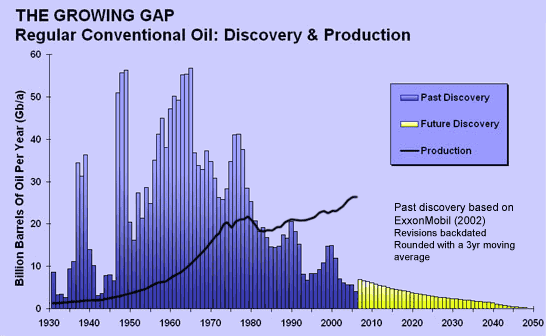A growing number of oil-industry chieftains are endorsing an idea long deemed fringe: The world is approaching a practical limit to the number of barrels of crude oil that can be pumped every day.
Some predict that, despite the world's fast-growing thirst for oil, producers could hit that ceiling as soon as 2012. This rough limit -- which two senior industry officials recently pegged at about 100 million barrels a day -- is well short of global demand projections over the next few decades. Current production is about 85 million barrels a day.
The world certainly won't run out of oil anytime soon. And plenty of energy experts expect sky-high prices to hasten the development of alternative fuels and improve energy efficiency. But evidence is mounting that crude-oil production may plateau before those innovations arrive on a large scale. That could set the stage for a period marked by energy shortages, high prices and bare-knuckled competition for fuel.
The current debate represents a significant twist on an older, often-derided notion known as the peak-oil theory. Traditional peak-oil theorists, many of whom are industry outsiders or retired geologists, have argued that global oil production will soon peak and enter an irreversible decline because nearly half the available oil in the world has been pumped. They've been proved wrong so often that their theory has become debased.
From The Wall Street Journal via Dow Jones Newswires via Rigzone
http://www.rigzone.com/news/article.asp?a_id=53040 This article gets EVERYTHING wrong. I'll break it down...
A growing number of oil-industry chieftains are endorsing an idea long deemed fringe: The world is approaching a practical limit to the number of barrels of crude oil that can be pumped every day.
Uh-huh...long deemed fringe - despite warnings dating to 1956 that, eventually, oil production would begin to decline. They knew it all along. PEAK OIL IS NOT FRINGE!
"Is approaching"? BULLSHIT! It's already here and has been since 2004. Oil production has not been able to increase for the past FIVE years!!!
Next...
Some predict that, despite the world's fast-growing thirst for oil, producers could hit that ceiling as soon as 2012.
...
Current production is about 85 million barrels a day.
WRONG! Actually, producers hit the production ceiling for crude oil in Jan. 2005, FIVE YEARS AGO! And the 85 million barrels per day cited is for ALL PETROLEUM LIQUIDS, (including natural gas liquids which the reporting agencies EIA and IEA began including in the oil production figures 2 years ago in order to mask the decline in crude). Crude oil production peaked at less than 74.8 million barrels per day in July of 2008 on the heels of that month's all time high price for crude $147 per barrel. The peak of cheap crude oil occured in Jan 2005 at 74.6 million barrels per day. CRUDE OIL production today is estimated at 69 million barrels, a decline of 5 million barrels per day.
Moving on...
But evidence is mounting that crude-oil production may plateau before those innovations arrive on a large scale.
...high prices and bare-knuckled competition for fuel
May plateau? That's funny SINCE IT ALREADY HAS PLATEAUED! It plateaued beginning in 2004!

High prices: Oil has been fluctuating around the $75 - $80 per barrel level for three months and rose from the $35 level over the course of the past year. Bare knuckle competition? What, like Afganistan and Iraq?
Moving further along...
The current debate represents a significant twist on an older, often-derided notion known as the peak-oil theory. Traditional peak-oil theorists, many of whom are industry outsiders or retired geologists, have argued that global oil production will soon peak and enter an irreversible decline because nearly half the available oil in the world has been pumped. They've been proved wrong so often that their ***THEORY*** has become debased.
Current dabate? What debate? THERE IS NO DEBATE AMONG THOSE STUDYING THIS ISSUE! All one has to do to know that we've already reached the peak in world oil production is to visit venues already studying the phenomenon like theoildrum.com and ASPO.
"They've been proved wrong so often that their theory has become debased." ... Really? So, how do we explain this:
U.S. oil production PEAKED in 1970, just as M. King Hubbert predicted in would in 1956.

Great Britain:

Mexico:

There's much more:

SOURCE:
http://www.theoildrum.com/node/5576">TheOilDrum.com
PEAK OIL HAS BEEN "PROVEN WRONG SO OFTEN THAT THE THEORY HAS BECOME DEBASED"? PFFFFT!!! WHAT FUCKING THEORY?
In fact, only 14 of the 54 oil producing nations in the world are still increasing their oil production. And those 14 are not now nor will they EVER be enough to make up for losses. And, as if this wasn't enough, DISCOVERIES OF OIL PEAKED IN 1964:

UNDERSTAND THIS: ECONOMIC GROWTH CANNOT BE SUSTAINED IN A DELCINING OIL PRODUCTION ENVIRONMENT!!!
Read this to get an idea of how declining oil production effects the economy:
http://kunstler.com/blog/2009/11/courting-convulsion.htmlI could go on with the rest of the article located at the link but it's late. Suffice it to say that this WSJ/DJ piece of propaganda is just that: HOGWASH! PEAK OIL IS ALREADY HERE! And, chances are, you still won't accept that "your world is about to get a whole lot smaller" <--- Google it.